Top 7 Translation Services for Medical Travelers
When you're seeking medical care abroad, accurate translation is not just helpful - it's critical. Miscommunication in medical settings can lead to severe health risks, as seen in the tragic case of Willie Ramirez in 1980, where a mistranslation left him quadriplegic. To avoid such outcomes, professional medical translation services ensure clear communication between patients and healthcare providers. These services are especially important for reviewing consent forms, discussing symptoms, or following post-operative care instructions.
Here’s a quick look at the top 7 translation services for medical travelers:
- LanguageLine Solutions: Handles over 87 million connections annually with telehealth integration.
- TransPerfect Medical: Focuses on medical document translation and localization.
- CyraCom: Offers fast, 24/7 emergency support with a 23-second average connection time.
- GLOBO: Covers 430+ languages with real-time language usage insights.
- ProTranslating: Affordable option for planned medical procedures.
- Certified Languages International (CLI): Specializes in ASL and Spanish interpretation.
- Stratus Video: Focuses on video remote interpretation for healthcare scenarios.
Quick Comparison
| Service | Languages | Key Feature | Starting Price | Response Time |
|---|---|---|---|---|
| LanguageLine Solutions | 240+ | Telehealth integration | $0.16/word | Standard rates |
| TransPerfect Medical | Multiple | Document translation expertise | $0.14/word | Standard rates |
| CyraCom | 300+ | Emergency-ready, fast response | Custom pricing | 23 seconds avg. |
| GLOBO | 430+ | Real-time language insights | Custom pricing | Standard rates |
| ProTranslating | Multiple | Budget-friendly pricing | $0.11/word | Standard rates |
| Certified Languages Intl. | 230+ | ASL and Spanish specialization | Custom pricing | Standard rates |
| Stratus Video | Multiple | Video interpretation focus | Custom pricing | Limited availability |
Choosing the right service depends on your needs. For emergencies, CyraCom is a strong choice. For cost-effective options, go with ProTranslating. If you need ASL or Spanish interpretation, CLI is reliable. Always check for certifications, 24/7 availability, and transparent pricing.
How to Translate Your Medical Report to any Language
How to Choose Translation Services
Picking the right translation service for your medical needs is more than just a practical decision - it’s a critical one. When dealing with medical communication, the stakes are high, and an informed choice can help avoid dangerous misunderstandings and ensure effective treatment.
Medical Knowledge and Certifications
When it comes to medical translation, certification is a must. It’s not enough for a translator to simply be bilingual. Medical translation requires a deep understanding of medical terminology, healthcare systems, and strict confidentiality standards.
Elena M., a certified medical interpreter and language operations manager for AMN Healthcare Language Services, explains:
"When you're talking about a professional interpreter, you're talking [about] not just somebody who knows the language... That is the first step. You have to be bilingual in two languages. However, that is not enough." [6]
Look for services that employ translators certified by reputable organizations. For example:
- The American Translators Association (ATA) offers well-regarded certification programs for medical translators.
- The National Board of Certification for Medical Interpreters (NBCMI) provides rigorous credentialing for interpreters.
- The Certification Commission for Healthcare Interpreters (CCHI) is another respected body offering healthcare-specific certifications [5].
These certifications ensure that translators possess the necessary linguistic skills, medical knowledge, and professional competence. Plus, certified professionals are required to stay current by participating in ongoing education, keeping them up-to-date with medical advancements and translation techniques [5].
Damian E., a certified healthcare interpreter for AMN Healthcare Language Services, highlights the importance of credentials:
"Once you have those credentials behind your name, it does open up doors. … That's one of the primary reasons why I advocate for being certified." [6]
Make sure the service you choose prioritizes continuous education for its translators. Medical knowledge evolves quickly, and staying updated is essential for accurate communication.
Language Options Available
In addition to medical expertise, language specificity is crucial. Many languages have regional dialects or variations that can lead to misunderstandings if not properly accounted for. For instance, Spanish, Portuguese, French, Arabic, and Chinese all have significant dialectal differences [7].
If you’re traveling to a linguistically diverse destination, such as South Africa, where over 50 languages are spoken, it’s vital to ensure your translator is fluent in the specific dialect needed [9].
Also, consider your own preferences. Your most comfortable language for medical discussions might differ from your everyday language [7]. The translation service should offer comprehensive support tailored to your destination and personal needs. With 2.3% of the global population living outside their home country, translation services must address a wide variety of language requirements [10].
Clear Pricing and Service Hours
Accurate translation isn’t just about expertise - it’s also about transparency. Understanding pricing upfront can help you avoid unexpected costs. Translation services often use different pricing models, including per-word rates, hourly charges, flat project fees, or even subscription-based options [14].
For medical translations, expect to pay:
- $0.12 to $0.15 per word for standard medical content
- $0.18 to $0.20 per word for more technical medical translations [11]
Hourly rates can range from $15–$30 for basic translation to $75 or more for specialized healthcare translation [13]. Be prepared for additional fees for services like rush delivery, sworn document translation, or certification [11].
Equally important is ensuring 24/7 availability. Medical emergencies don’t wait for business hours, so choose a service that provides round-the-clock access to qualified interpreters - not just automated systems.
Remote interpreting options, such as telephone or video services, are often more affordable and convenient for medical travelers. Just make sure the quality of remote interpretation matches that of in-person services [12].
Robert Cain, Employee Relations Specialist at Yourco, sums up the variability in pricing:
"The typical cost of professional written translation services depends on many factors, like the difficulty of the text, how fast it needs to be done, and the skill of the translator." [14]
To save money and ensure availability, plan ahead. Last-minute requests can lead to higher fees and limited access to top translators, which can be especially problematic for medical needs.
Quick Comparison of Leading Translation Services
Before jumping into detailed reviews, let’s take a quick look at how some of the top translation services for medical travelers stack up. This table highlights their language offerings, pricing, and standout features to help you identify the right fit for your needs.
| Service | Languages Available | Key Strengths | Starting Price | Connection Speed |
|---|---|---|---|---|
| LanguageLine Solutions | Over 240 languages | Telehealth integration; handles 87 million connections annually | $0.16 per word | Standard rates |
| TransPerfect Medical | Multiple languages | Member-focused solutions for health plans; comprehensive localization | $0.14 per word | Standard rates |
| CyraCom | Over 300 languages | Video interpretation across 35+ languages; healthcare specialization | Custom pricing | 23-second average |
| GLOBO | Over 430 languages | Real-time insights on language utilization; broad coverage | Custom pricing | Standard rates |
| ProTranslating | Multiple languages | Competitive per-word pricing | $0.11 per word | Standard rates |
| Certified Languages International (CLI) | Over 230 languages | Specializes in ASL and Spanish interpretation; strong healthcare client base | Custom pricing | Standard rates |
Here’s a closer look at what makes each service stand out.
LanguageLine Solutions is a powerhouse, managing over 87 million connections annually. This level of experience equips them to handle high-pressure medical situations with ease. Dr. Barry J Segal shared an example from a neurosurgical procedure:
"The video interpreting solution offered by LanguageLine was critical to communicate with a patient who was deaf during an embolization of an intracranial aneurysm. The LanguageLine video monitor was brought into the neuroradiology operating room to enable communication by my voice and American Sign Language."[15]
CyraCom is ideal for emergencies, with an average connection time of just 23 seconds. Its video interpretation service supports more than 35 languages, making it a strong choice for video consultations.
GLOBO stands out for its extensive coverage of 430+ languages and its real-time insights on language usage[2], which can be particularly helpful for diverse patient populations.
For those keeping an eye on costs, ProTranslating offers one of the lowest rates at $0.11 per word. Meanwhile, TransPerfect Medical provides member-focused services at $0.14 per word, catering specifically to health plans and localization needs[16].
Lastly, Certified Languages International (CLI) specializes in American Sign Language (ASL) and Spanish interpretation, backed by a solid reputation in the healthcare industry.
Your choice will depend on your specific needs. For emergencies, CyraCom’s quick connections are a lifesaver. Complex medical scenarios might benefit from the comprehensive solutions offered by LanguageLine Solutions or TransPerfect Medical. If you need ASL or Spanish interpretation, CLI is a strong contender. And for straightforward cases on a budget, ProTranslating offers great value.
sbb-itb-3922076
Top 7 Translation Services for Medical Travelers
Here’s a closer look at some of the top translation services catering to the unique needs of medical travelers. Each service offers something distinct to help bridge language gaps in healthcare.
LanguageLine Solutions
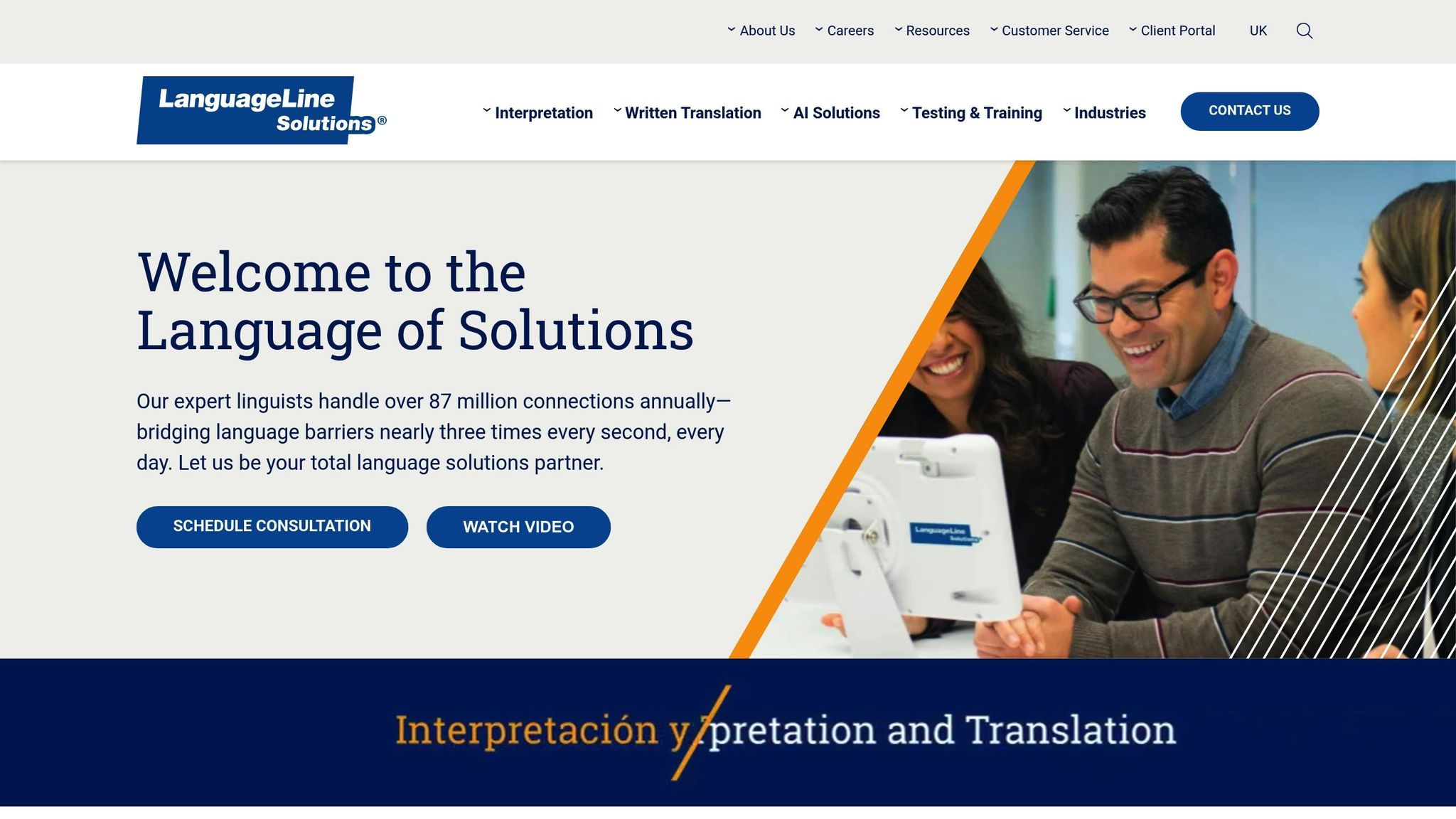
LanguageLine Solutions is a leader in medical interpretation, handling over 87 million connections annually [15]. They provide 24/7 access and integrate seamlessly with telehealth platforms, making them a reliable choice for remote consultations [3]. However, during busy times, response times might be slower [3].
TransPerfect Medical
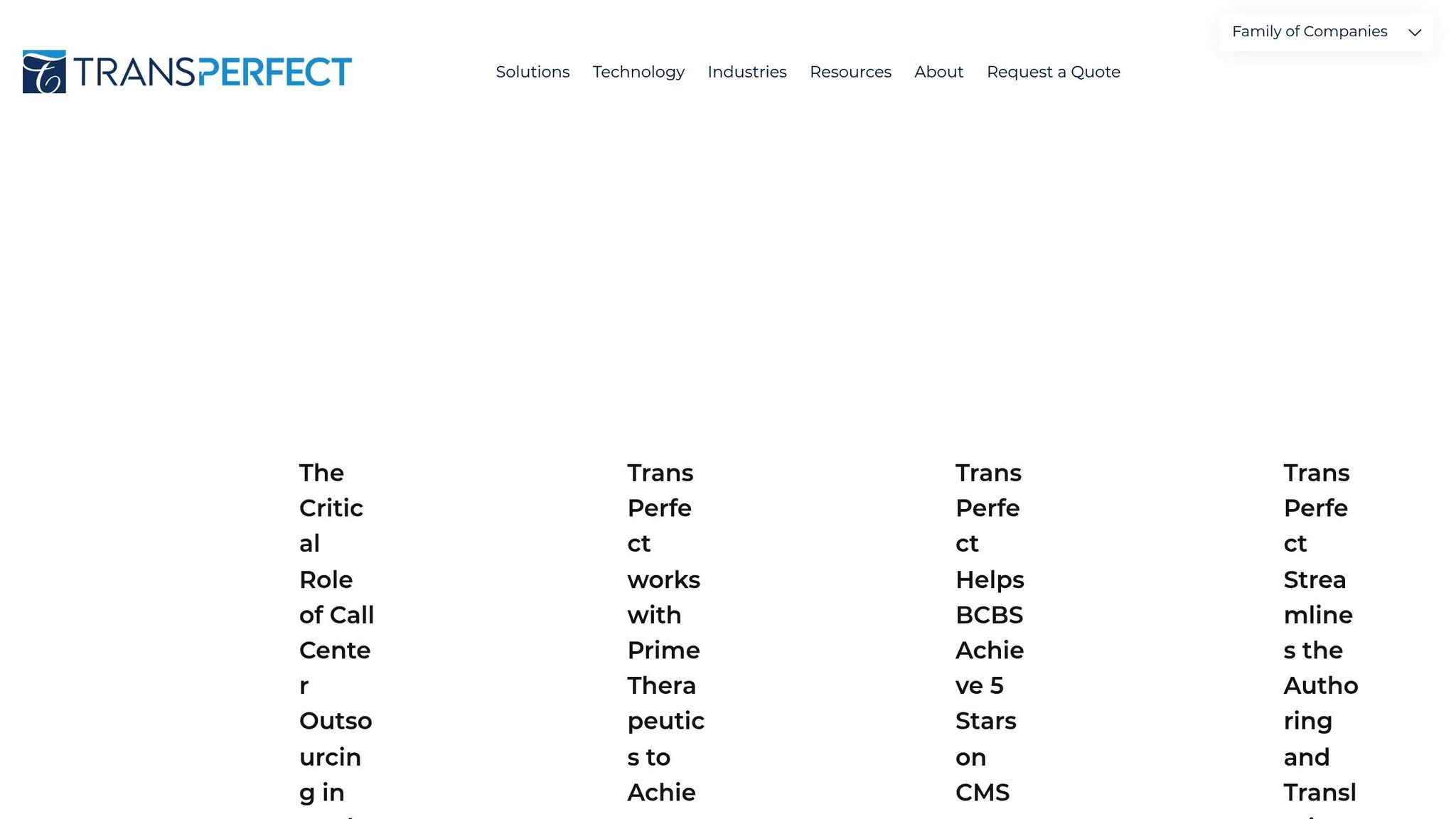
TransPerfect Medical focuses on translating medical documents and offers a range of interpretation services, including on-site, over-the-phone, and video remote options. Their expertise is particularly helpful for navigating complex insurance forms and medical records. While their premium services are thorough, they come with higher costs and a more intricate setup process [17][3].
Stratus Video
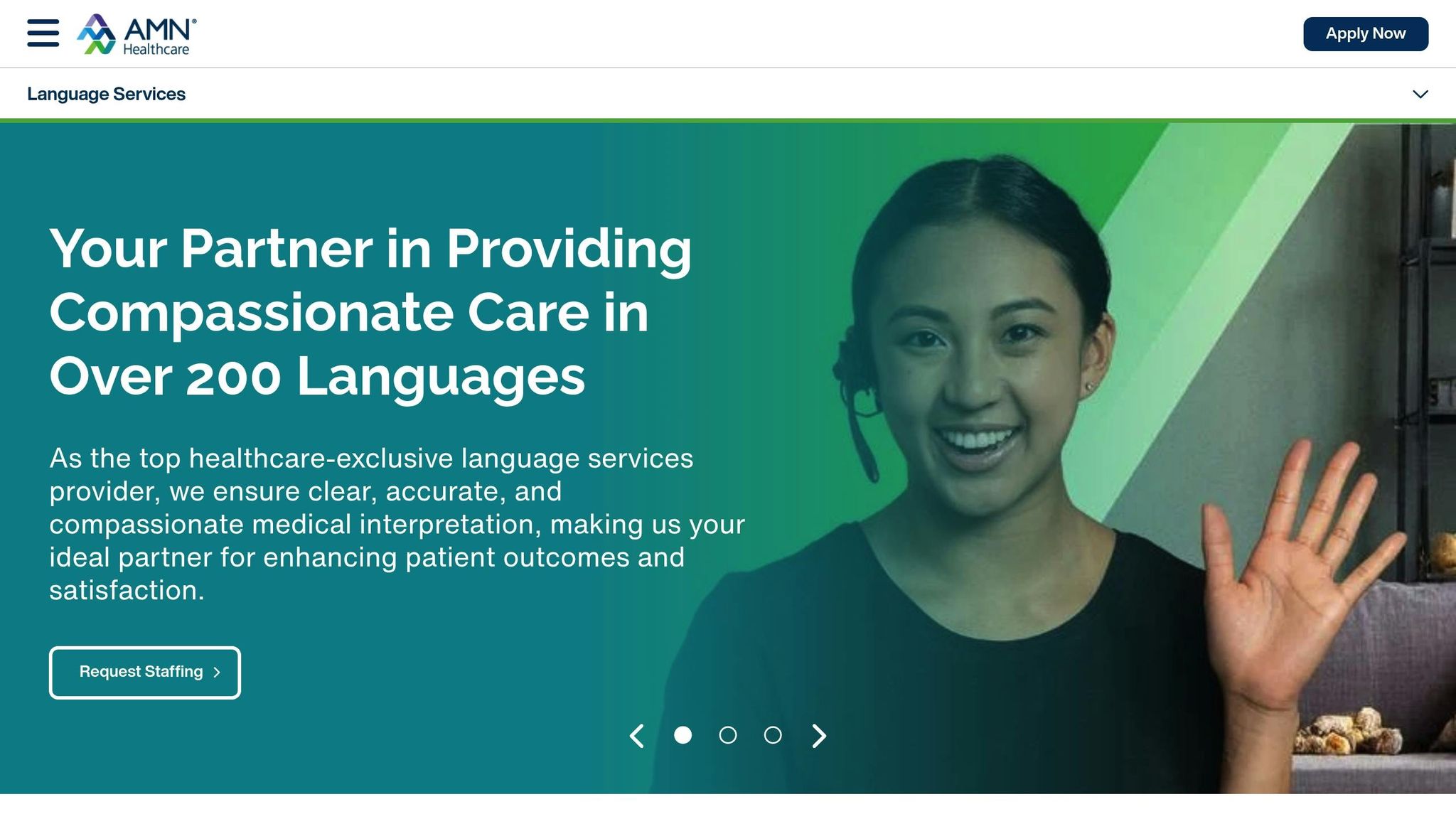
Part of AMN Healthcare Language Services, Stratus Video specializes in video remote interpretation tailored for healthcare. This service is especially useful during procedures or consultations where visual communication can enhance understanding. While their video interpretation is robust, their availability for phone or on-site services may be more limited [3].
CyraCom
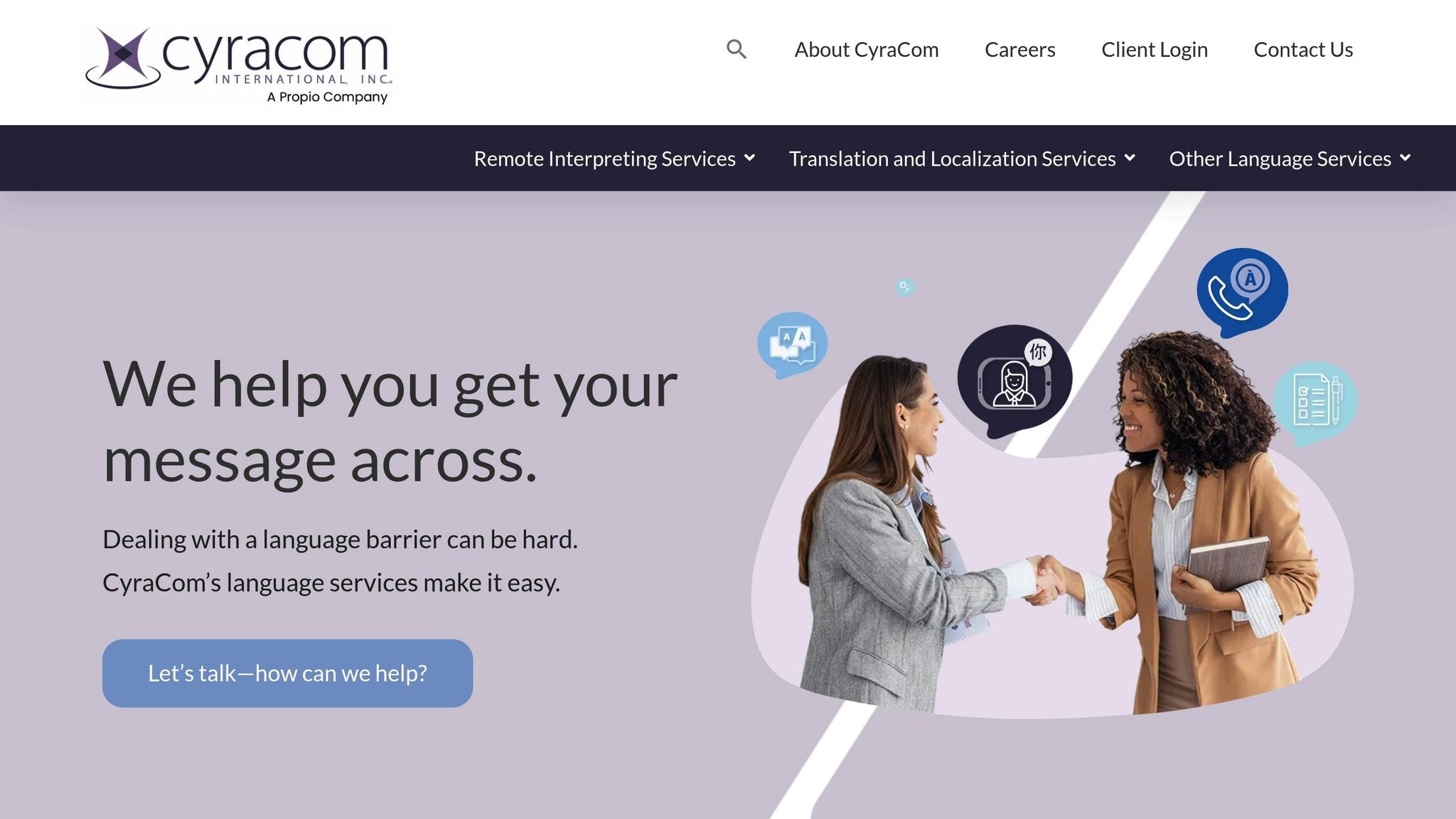
CyraCom stands out in emergency situations, with an average connection time of just 23 seconds [3]. Their phone and video interpretation services are available around the clock, ensuring immediate support when time is critical. The platform integrates smoothly with healthcare systems, ensuring compliance and reliable performance. High satisfaction rates among interpreters further highlight their dependability [3].
GLOBO
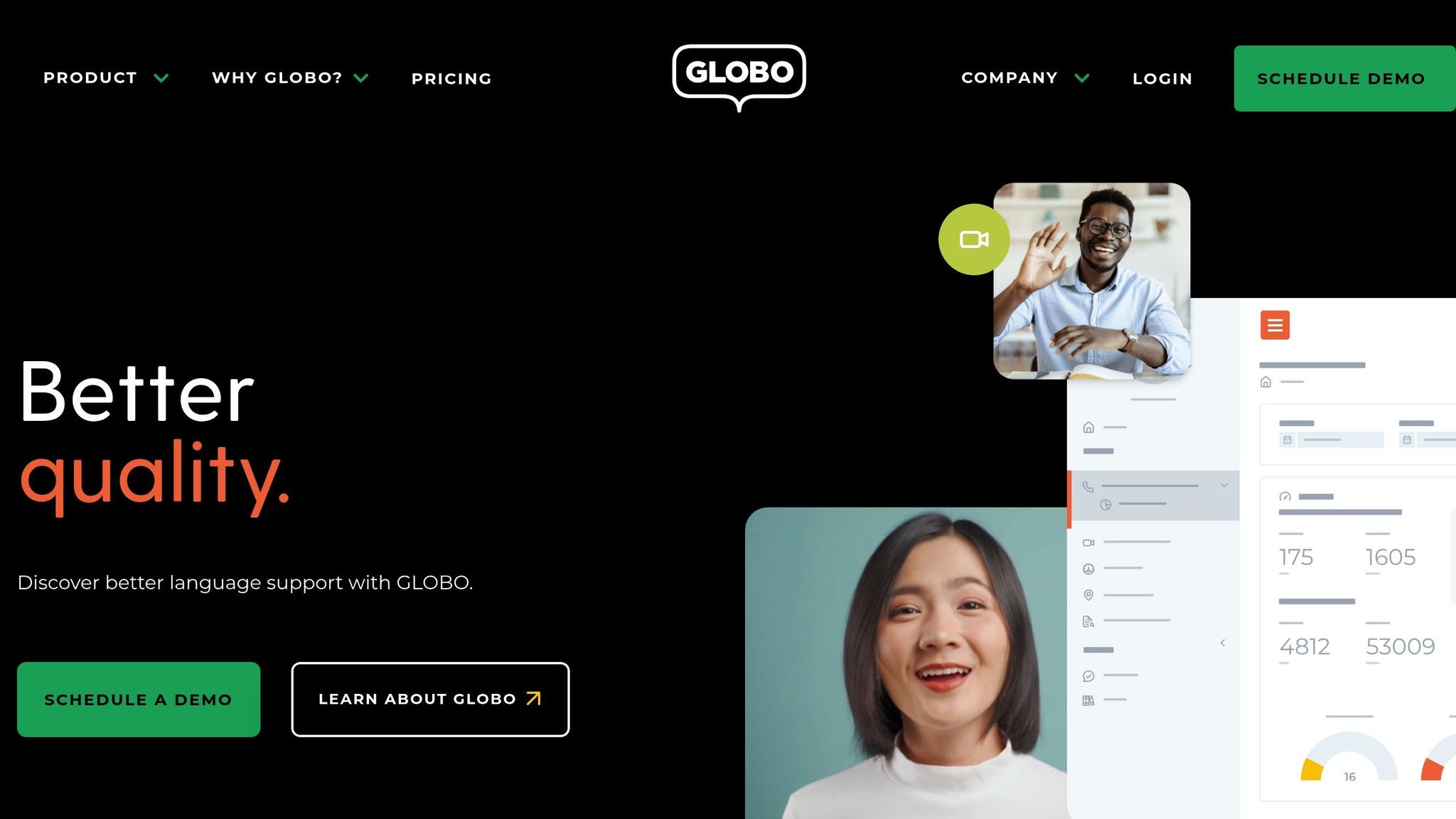
GLOBO offers extensive language coverage, making it a versatile option for healthcare interpretation. Their multichannel services include phone, video, and on-site interpretation, providing flexibility for varying needs. Real-time language usage insights help healthcare providers optimize services, while 24/7 availability ensures constant support [2].
ProTranslating
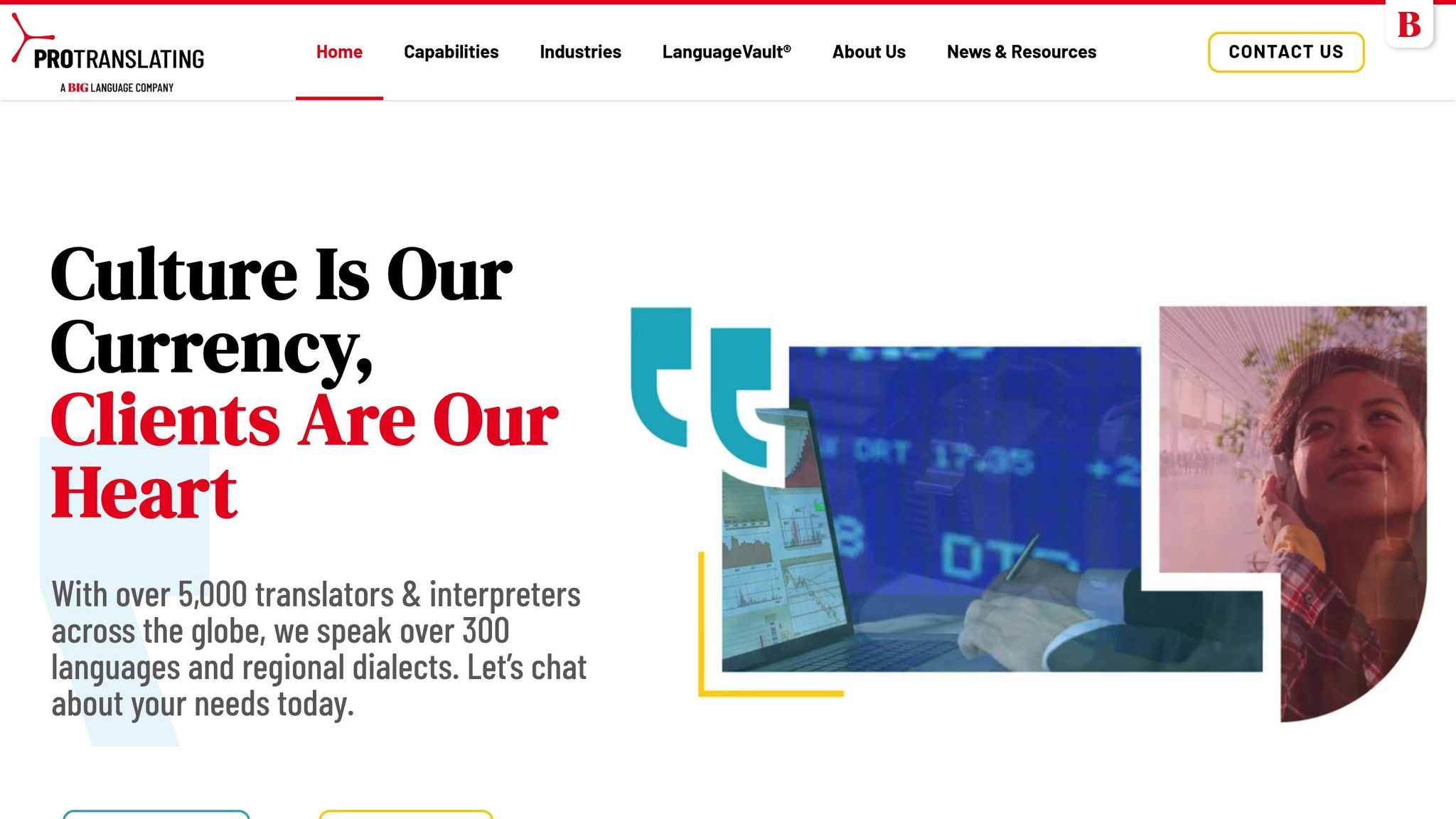
ProTranslating is a budget-friendly option that doesn’t compromise on quality. They emphasize precise medical translations, covering everything from test results to treatment plans. While their response times may not be the quickest, their affordability and accuracy make them a great choice for planned medical procedures.
Certified Languages International (CLI)
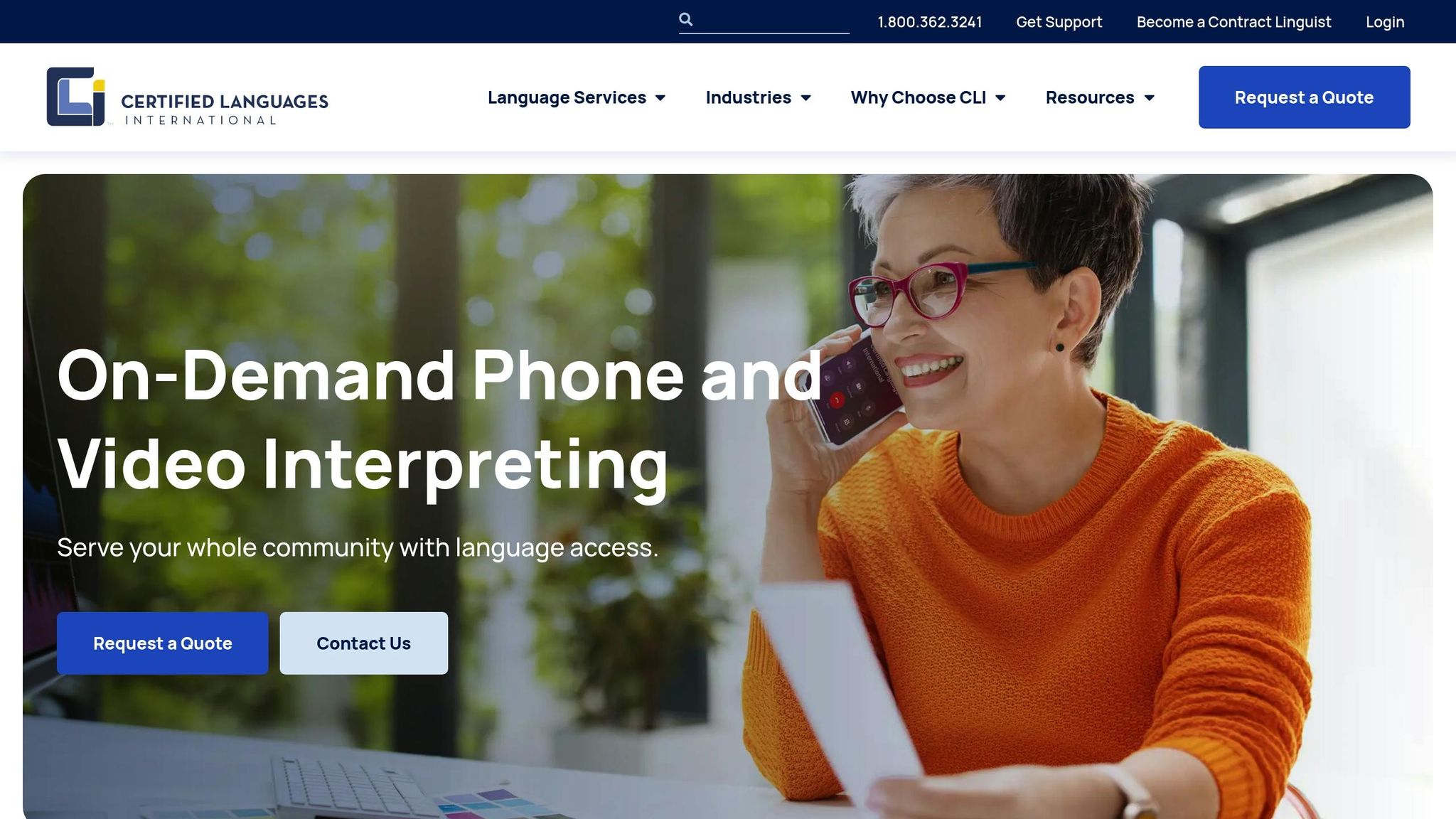
Certified Languages International focuses on specialized language support, particularly for American Sign Language (ASL) and Spanish - two key languages in the U.S. healthcare system. Available 24/7 [17], their interpreters are skilled in medical terminology, ensuring clear and effective communication [8]. CLI is a strong option for medical travelers needing ASL or Spanish interpretation to enhance their care experience.
Tips for Choosing a Translation Service
Clear communication is critical when navigating medical travel, and the right translation service can make all the difference. While credentials, pricing, and support are key factors, it’s equally important to focus on the finer details to avoid any miscommunication. Here’s a closer look at essential considerations to guide your choice.
Check Translator Credentials
National certifications are a strong indicator of quality and reliability. Look for translators certified by organizations like CCHI and NBCMI, which uphold rigorous standards through accredited assessments [18] [19].
For languages such as Spanish, Korean, Mandarin, Russian, Cantonese, and Vietnamese, seek professionals with the Certified Medical Interpreter (CMI) credential from NBCMI. Their credentials can be verified through NBCMI's online registry [4].
These certifications come with strict requirements: interpreters must be at least 18 years old, possess a high school diploma or GED, complete 40+ hours of medical interpretation training, and demonstrate fluency in English and their primary language [18]. For added assurance, consider services employing translators with advanced degrees in medical interpretation [6].
Review Pricing Models
Translation services often have varied pricing structures. For interpretation, you might encounter per-minute rates, while document translation typically comes with flat fees. Some services offer volume discounts or early booking deals, which can help reduce costs for planned medical procedures [20].
Be wary of services with vague pricing. Hidden fees can quickly add up, especially during extended consultations or emergencies. Always ask about additional charges for after-hours or expedited services.
If you require both interpretation and document translation, look for bundled pricing options. These packages can save money and simplify your medical travel arrangements [20].
Confirm 24/7 Support and Platform Integration
Medical situations don’t stick to a schedule, so round-the-clock availability is non-negotiable. Ensure the service offers true 24/7 human support - not just automated responses. Immediate access to a live interpreter can be crucial in emergencies.
Additionally, platform integration is essential if you’re using a medical tourism service like Explore Medical Tourism. This platform connects patients with accredited healthcare providers worldwide and offers detailed profiles for various procedures. Your translation service should integrate seamlessly with such systems, as well as telehealth platforms and other healthcare tools.
Check response times to ensure they align with your needs, and verify that the service can handle secure and efficient communication throughout your medical journey. This level of integration can significantly ease the stress of navigating healthcare in a foreign language.
Conclusion
Translation services are a vital part of ensuring safety and success in medical travel. When seeking healthcare in a foreign country, clear and accurate communication can literally save lives. Medical interpreters act as the crucial link between patients and medical staff, ensuring precise and culturally appropriate communication for those with limited English proficiency [22].
In the United States, about 10% of working adults have limited English proficiency, and nearly 15% of adults aged 18 and older experience some level of hearing difficulty [23]. These statistics underscore the importance of professional interpreters, especially when navigating healthcare systems abroad. For example, one hospital reported a 30% improvement in patient understanding and compliance with treatment plans after introducing professional translation services for consent forms [1].
Beyond simply translating words, professional services help foster trust and understanding between patients and their healthcare providers. Certified interpreters have been shown to improve patient outcomes and satisfaction compared to informal interpretation methods [21].
When your health is on the line, having access to certified, round-the-clock translation services is not a luxury - it's a necessity. These services enhance every aspect of your international medical experience, ensuring safety, clarity, and peace of mind.
FAQs
::: faq
How can I confirm that a translation service uses certified medical interpreters?
When evaluating a translation service to ensure they use certified medical interpreters, look for interpreters who have completed a minimum of 40 hours of specialized training in medical interpretation. They should also be certified by a reputable organization, such as the National Board of Certification for Medical Interpreters or another recognized accrediting body.
It's also a good idea to ask about their interpreters' familiarity with medical terminology and their experience managing sensitive healthcare conversations. This helps guarantee precise and dependable communication throughout your medical experience. :::
::: faq
What should I look for in a translation service during a medical emergency?
When selecting a translation service during a medical emergency, it's essential to prioritize language fluency and the interpreter's expertise in accurately handling medical terminology. Seek out professionals who hold relevant certifications, have experience working in healthcare environments, and demonstrate a strong understanding of cultural nuances to ensure effective communication.
Equally important is choosing a service that upholds strict confidentiality, maintains a high level of professionalism, and provides fast response times to address urgent situations without delay. :::
::: faq
What are some affordable yet reliable medical translation services for travelers?
If you're in need of affordable medical translation services that don't sacrifice quality, there are some great choices to consider. RushTranslate offers certified translations starting at just $24.95 per page, combining precision with professionalism. For those leaning toward a tech-based approach, DeepL provides AI-powered translations in more than 30 languages, offering both budget-friendly rates and detailed results. These options are well-suited for medical travelers seeking reliable translations without breaking the bank. :::
